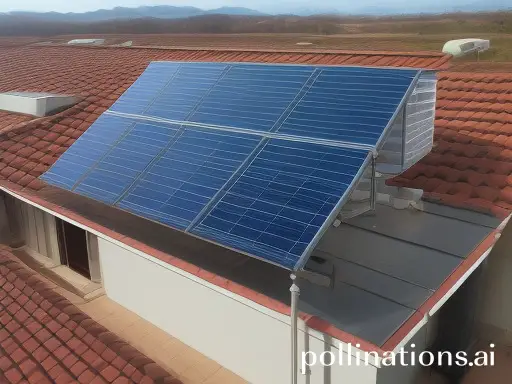Explore the captivating power of solar heaters in reducing your utility bills. These innovative devices harness the energy of the sun to provide an eco-friendly and cost-effective solution. Our comprehensive guide will walk you through the process, from understanding how solar heaters work to selecting the perfect one for your needs. Discover the advantages, installation options, and government incentives available.
Embrace the benefits of renewable energy and say goodbye to high utility expenses. Join us on this intriguing journey towards a greener future.

How Solar Heaters Work
Converting Sunlight into Heat Energy
Solar heaters are devices that use the sun’s power to provide heat energy. They are environmentally friendly and cost-effective compared to traditional heating systems.
Solar heaters convert sunlight into heat energy through solar thermal heating. Solar collectors, usually mounted on rooftops or areas with sun exposure, contain solar panels with tubes or channels.
When sunlight hits the solar panels, it is absorbed and converted into heat. This heat is transferred to a fluid, like water or antifreeze, flowing through the tubes or channels. The fluid becomes hot and can be used for various purposes.
Types of Solar Heaters Available
There are different types of solar heaters available, each with unique features and advantages:
1. Solar Water Heaters: These systems heat water for domestic use or space heating. They consist of solar collectors, a storage tank, and a circulation system. Solar water heaters can significantly reduce the need for conventional water heating methods, leading to savings on utility bills.
2. Solar Air Heaters: These heaters warm the air using solar energy for space heating or ventilation. They are often integrated with existing heating systems to supplement heat and reduce energy consumption.
3. Solar Pool Heaters: Specifically designed for heating swimming pools, solar pool heaters use solar collectors to heat the pool water directly. This extends the swimming season and reduces the reliance on conventional pool heating methods, resulting in cost savings.
Solar heaters provide an efficient and sustainable solution for reducing utility bills. Whether you choose a solar water heater, solar air heater, or solar pool heater, these systems tap into abundant solar energy and offer a greener and more cost-effective heating solution.
Save money and the environment with solar heaters. Harness the power of the sun for efficient and cost-effective heating.Advantages of Using Solar Heaters
Switching to solar heaters offers several advantages. They can save money and help the environment. Solar heaters use renewable energy, which reduces utility bills and promotes a cleaner future.
Lowering Monthly Utility Expenses
Solar heaters are a cost-effective alternative to traditional heating systems. They save money on monthly utility expenses. By using the sun’s energy to heat water or air, solar heaters don’t need electricity or gas. This lowers energy consumption and reliance on non-renewable resources, resulting in significant savings on utility bills.
Environmental Benefits of Renewable Energy
Solar heaters have a positive impact on the environment. Solar energy is clean and renewable. It doesn’t produce greenhouse gas emissions or air pollutants. Choosing solar heaters helps mitigate climate change and reduce carbon footprints. Solar heaters also don’t require fuel or combustible materials, minimizing harmful pollutants released into the atmosphere.
To understand the advantages of solar heaters better, here are the key benefits:
| Advantages | Description |
|---|---|
| Lower utility bills | Solar heaters significantly reduce monthly utility expenses by using renewable energy. |
| Environmental sustainability | Solar heaters contribute to a cleaner and greener future by reducing carbon emissions and reliance on non-renewable resources. |
By embracing solar heaters, individuals can save money and support a more sustainable and eco-friendly world.
Tips for Choosing Solar Heaters
Factors to Consider when Selecting a Solar Heater
When choosing a solar heater, consider the following factors to make an informed decision and maximize the benefits of solar heating:
- 1. Size: Determine the appropriate size of the solar heater based on your household’s hot water consumption. Consider the number of occupants and their average daily hot water usage.
- 2. Efficiency: Look for solar heaters with high energy efficiency ratings. Choose models with advanced technologies like evacuated tube or flat plate collectors, known for their excellent heat absorption capabilities.
- 3. Durability: Solar heaters are a long-term investment, so choose a system that is built to last. Consider the quality of materials used, warranty periods offered by manufacturers, and customer reviews.
Comparing Different Solar Heater Types
To help you in your decision-making process, here is a comparison of the two main types of solar heaters available:
| Type of Solar Heater | Advantages | Disadvantages |
|---|---|---|
| Evacuated Tube Collectors |
|
|
| Flat Plate Collectors |
|
|
Consider these differences when evaluating the suitability of each type for your specific circumstances.
By considering the size, efficiency, and durability of solar heaters, you can make an informed decision that aligns with your hot water needs and reduces your utility bills. Consult with reputable solar heating professionals to ensure the best choice for your home.

Installing Solar Heaters
A. Step-by-step guide for residential or commercial properties
- 1. Assessing the property’s solar potential: Evaluate the amount of sunlight your property receives throughout the day to determine its solar potential.
- 2. Determining the appropriate size and type of solar heater: Consider factors such as the size of your property and your heating needs to select the right size and type of solar heater.
- 3. Selecting the location for installation: Identify a suitable location on your property with unobstructed access to sunlight for maximum efficiency.
- 4. Installing the solar panels or collectors: Follow the manufacturer’s instructions to securely mount the solar panels or collectors on your property.
- 5. Connecting the solar heater to the existing heating system: Integrate the solar heater with your existing heating system to ensure seamless operation.
- 6. Testing and adjusting the system for optimal performance: Conduct thorough testing and make necessary adjustments to optimize the performance of your solar heating system.
B. Professional installation services vs. DIY options
- 1. Benefits of hiring professional installers: Discover the advantages of hiring experienced professionals for solar heater installation, including expertise and warranty coverage.
- 2. Cost considerations for professional installation: Understand the factors that influence the cost of professional installation services, such as system complexity and labor fees.
- 3. DIY installation options and considerations: Explore the possibility of installing solar heaters yourself, taking into account the required skills, time commitment, and potential cost savings.
| Information |
|---|
| Installing solar heaters can significantly reduce utility bills by harnessing the power of the sun to provide efficient heating. Follow a step-by-step guide to successfully install solar heaters on your residential or commercial property. Start by assessing your property’s solar potential, determining the appropriate size and type of solar heater, and selecting the ideal installation location. Once the solar panels or collectors are installed, connect the solar heater to your existing heating system and test the system for optimal performance. |
When it comes to installation, you have the option to hire professional installers or embark on a DIY project. Hiring professionals offers benefits such as their expertise and warranty coverage, ensuring reliable and efficient installation. However, consider the cost implications of professional installation, which can vary based on factors like system complexity and labor fees. Alternatively, if you have the necessary skills and time, you may choose to install solar heaters yourself. DIY installation can provide cost savings, but carefully evaluate your capabilities and the potential challenges involved.
Government Incentives and Tax Credits for Solar Heaters
Financial Incentives for Using Solar Energy
Using solar heaters helps reduce your carbon footprint and saves money on utility bills. Governments offer financial incentives and tax credits to encourage the adoption of solar energy, making it more accessible and affordable.
One of the primary financial incentives is the federal investment tax credit (ITC). This credit allows you to deduct a percentage of the installation cost of a solar heating system from your federal taxes. Currently, the ITC provides a 26% credit for residential installations, making it attractive for homeowners.
State and local governments also provide their own incentives, such as grants, rebates, or low-interest loans for solar energy system installations. Research the programs available in your area to maximize savings and take advantage of all available incentives.
Researching Local, State, and Federal Programs
To find out about incentives and tax credits for solar heaters, visit the websites of your local and state energy departments or environmental agencies. These resources provide comprehensive information about incentives, eligibility requirements, and application processes.
The U.S. Department of Energy’s Database of State Incentives for Renewables & Efficiency (DSIRE) is another valuable tool. It offers an up-to-date database of federal, state, local, and utility incentives and policies related to renewable energy and energy efficiency.
Explore these resources and understand the available incentives to make an informed decision about installing solar heaters. Consult with local solar installers for further guidance on specific incentives and tax credits applicable to your situation.
Benefits of Government Incentives and Tax Credits for Solar Heaters:
- Cost Reduction: Financial incentives and tax credits significantly reduce upfront costs, making solar heaters more affordable.
- Increased Savings: By utilizing solar energy, you can reduce reliance on traditional utility providers and enjoy long-term savings on utility bills.
- Environmental Impact: Switching to solar heaters helps reduce greenhouse gas emissions and supports the global transition to clean and renewable energy sources.
Conclusion
Switching to solar heaters offers numerous benefits, including reduced utility bills and environmental advantages. These heaters harness the power of the sun to efficiently convert sunlight into heat energy, providing a renewable source of warmth. Consider factors like size, efficiency, and durability when choosing a solar heater, and decide whether to hire professionals or opt for a DIY installation.
Take advantage of government incentives and tax credits available to promote the adoption of solar energy. Exploring solar heaters is a worthwhile endeavor that can lead to long-term savings and contribute to a greener future.
Faq about Solar Heaters
FAQ 1: Suitability of solar heaters for all climates
Solar heaters are suitable for various climates, including sunny and partially cloudy regions. Advancements in technology have made them effective even in less sunny climates. While the efficiency of solar heaters may vary based on sunlight availability, they can still provide significant energy savings and reduce utility bills.
FAQ 2: Typical lifespan of solar heaters
The typical lifespan of solar heaters is 15 to 20 years. With proper installation and maintenance, solar heaters can last even longer. Choosing high-quality solar heaters from reputable manufacturers ensures durability and maximizes their lifespan.
FAQ 3: Use of solar heaters for heating water
Solar heaters are commonly used for heating water. They utilize the sun’s energy to heat a fluid, which then transfers the heat to the water. This heated water can be used for bathing, washing dishes, and space heating. Solar heaters are a cost-effective and eco-friendly alternative to traditional water heating methods.
FAQ 4: Maintenance requirements for solar heaters
Solar heaters require minimal maintenance. Regular inspections, cleaning of solar panels, checking for leaks, monitoring fluid levels, and maintaining insulation are recommended. Consulting the manufacturer’s guidelines for specific maintenance requirements is advisable.
FAQ 5: Potential drawbacks or limitations of solar heaters
While solar heaters offer numerous benefits, they do have some limitations. One limitation is their dependence on sunlight, which means their efficiency may vary in cloudy or shaded areas. Additionally, the initial installation cost of solar heaters can be higher compared to traditional water heating systems. However, the long-term energy savings and environmental benefits often outweigh these drawbacks.

